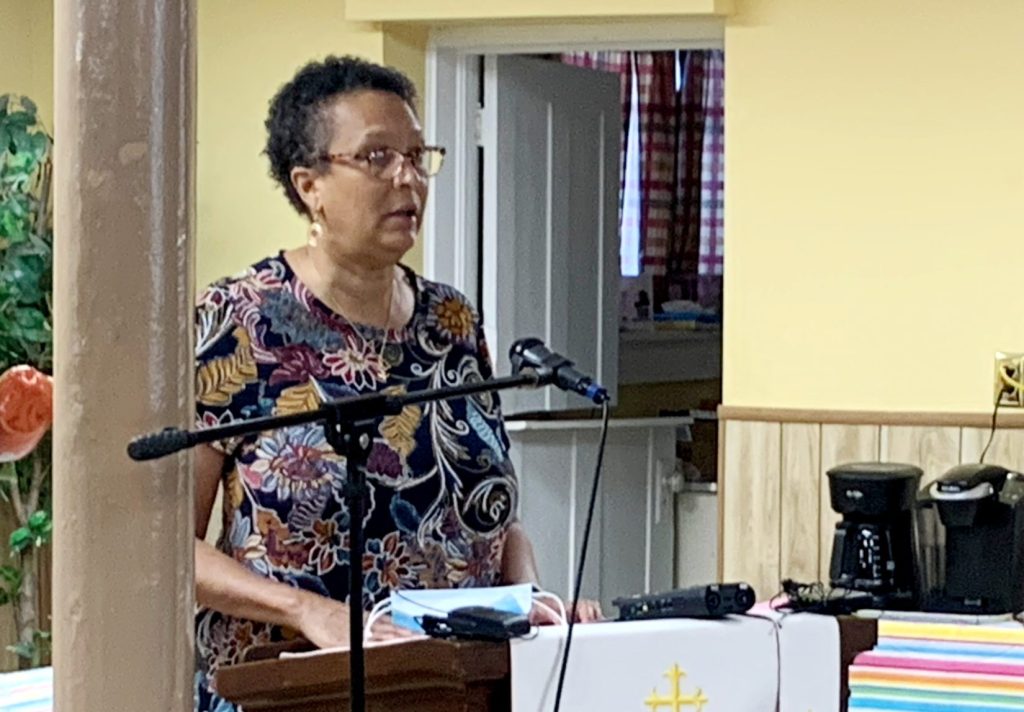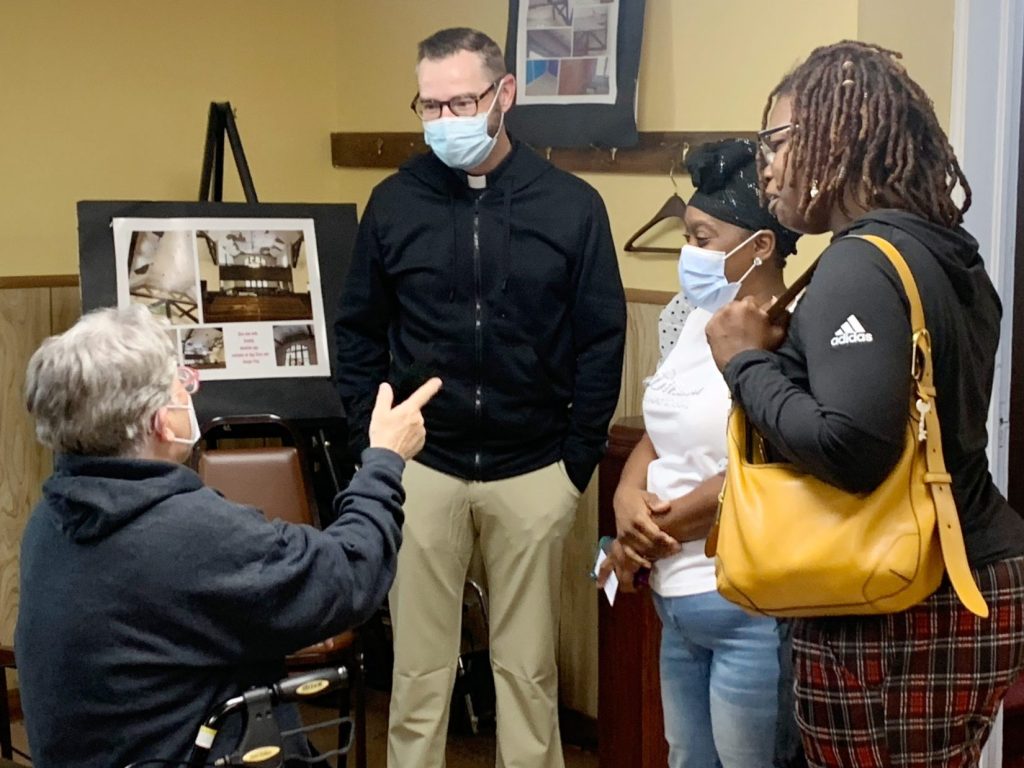Anger. Sadness. A heavy sigh. A call to speak out, and a call to come together.
Sometime late May 18 or early May 19, a person or persons used spray paint to draw a universally-known hate symbol on the side of Pitts Chapel United Methodist Church, the oldest and longest running historically African American church in Springfield.
Rev. Tracey Wolff is the pastor at Pitts Chapel. While public speaking is part of her career, she admitted she was nervous to speak at a different sort of gathering at the church on the morning of May 27. Pitts Chapel, the Springfield chapter of the NAACP, and several partner groups hosted a press conference to speak out about the hate crime that occurred at Pitts Chapel.
“That is a tension that you hold as the Black community here in Springfield,” Wolff said. “The tension is, ‘What’s going to happen next?’ And that’s real.”
Wolff spoke about what it’s like to experience a hate crime, both on a personal level and as a member of a church congregation.
“It is a traumatic thing, especially in light of the other things that are happening in our community,” Wolff said. “I was living about five or 10 miles from Ferguson when Michael Brown was killed, so I have some particular angst about things like this, so that is hard on myself personally.”
Bringing the thought back to Benton Avenue and Pitts Chapel, Wolff brought up the significance of the church building to a historically Black congregation.
“This is your safe haven, this is your sanctuary beyond the word ‘sanctuary,’ so when something like this happens, it can disrupt that,” Wolff said.
Wolff said that the incident at Pitts Chapel has made her congregation more resilient, and has elevated the idea of sanctuary to the people who worship there.
“Those things do weigh on you, but that’s why I named that we trust God, we trust our savior, and we’re going to keep worshiping, and we’re going to keep following Jesus, and what we’re going to do is take a stand and say, ‘No more,’” Wolff said.
Employees of the Springfield-Greene County Park Board cleaned the symbol from the exterior of the building shortly after it was discovered.
Significance of Pitts Chapel, and the response to a hateful act

Pitts Chapel was founded by enslaved Africans in 1847. In November 2019, the congregation started a capital campaign and renovation project to restore the church sanctuary.
“We have been crystal clear this renovation is about more than a building,” Wolff said. “We believe God is doing something new in our church and new in this city. Though we are historically black, on Sunday mornings at 11 a.m. at Pitts Chapel, we are becoming one of the most diverse places in town.”
Springfield NAACP chapter president Kai Sutton also spoke to the feelings that surface when a hateful act is brought against African Americans.
“First and foremost, it’s extremely painful. It’s a hurtful reminder that we’ve come really far, but we’re still in the same place when it comes to being reminded again — to endure that kind of hate. It’s painful,” Sutton said.
As the local president of the NAACP, Sutton said it’s important for Black leaders to speak up when acts of hate occur in their own communities
“No matter what we do, you’re being judged for the good, the bad and how fast you move,” Sutton said. “But I do think that we are doing the right thing by speaking up and calling it out, and saying collectively as a community we stand united and we’re saying, ‘No more.’”
A chance for candid conversations
Many of the clergy members, reporters and persons who attended the briefing at Pitts Chapel are white. Sutton said there are conversations they can have amongst themselves in response to hate crimes.
“Why?” Sutton said. “Why? In 2022, why? Why is this still going on, why is it still happening, why are people still holding that hate in their hearts?”
“This is a predominantly white community,” Wolff said. “When you show up, it says, ‘We’re serious, we don’t want this anymore, we don’t want this history to keep repeating itself.’”
Wolff and Sutton both pointed out that there have been similar incidents with hate symbols being placed at the Bartley-Decatur Neighborhood Center at Silver Springs, and at the Deliverance Temple on West Chestnut Expressway.
“We can and we should be tired of these acts of violence,” Wolff said. “There has been enough of that in Springfield historically, recently in recent years, and we all know it. We can and should be angry about what has taken place here at Pitts Chapel. I pray that this be a righteous anger that propels us forward. I pray that this be a holy anger that helps us stand firm.”
The incident at Pitts Chapel is but one in a litany of bad acts perpetrated against African Americans in Springfield. To change the course for the better, Wolff and Sutton agreed that it will take people of all races banding together to shrink the tolerance for hateful acts.
“It’s going to take the entire community, it’s going to take all of us standing up and speaking out when these things happen so that the community is aware, ‘Oh, it just happened that one time,’ no,” Wolff said. “It’s happening over and over, and there’s probably more experiences like this where people were a little afraid and didn’t speak up.”
“We’re going to continue to move forward together,” Sutton said. “We’re going to continue to fight back the right way, and we’re going to continue to demonstrate acts of kindness, love, unity — because that’s what we’re about, and that’s what community is.”

Elected leaders respond
Springfield City Councilwoman Monica Horton started her 40th day of serving as the Council’s Zone 1 representative by going to the gathering at Pitts Chapel. Horton was selected on April 12 and sworn in on April 18 to serve out a term in a previously vacant position.
Horton chairs the board of directors for Ujima Language and Literacy, which provides opportunities for children to build language skills. The group’s base of operations is the Bartley-Decatur Community Center. In June 2021, vandals painted racial slurs and symbols on the exterior walls of the community center.
“When that happened, it really rocked us,” Horton said. “It’s really, really frustrating too, when you’re constantly in the public spotlight and you know that Springfield wants to have a better image. They want to have a better image in terms of ‘This is who we want to be as a community,’ and we want our identity to rise above our history of hate.”
Horton said that any Springfieldian, regardless of their race or which part of town they live in, can’t experience humanity without fellowship, and that’s why it’s important to talk about hate crimes when they happen.
“It’s not giving it more credence than what it needs, it’s just the thing of we’re standing up and saying, ‘No,’ and we’re going to make that reflective in our actions, our behavior and our policies,” Horton said.
Horton shared that she has a daughter who is 12. She and her husband try to teach their daughter a blend of the pain and pride found in Black history.
“Our history is not just made up of pain and struggle and strife, it’s also made up of beauty, and it’s made up of a sense of overcoming and resilience and pioneering,” Horton said. “We have to have a balanced conversation, but we certainly do not shy away from it when we’re talking about it in our house.”
Moving forward, Horton hopes to encourage Springfield residents to practice neighborly principles and to strive for empathetic listening in their conversations about race.
“Yes, we can deal with it on a personal level, but there are some systemic things, too, on a larger level that need to be addressed,” Horton said. “It’s not just an interpersonal issue or an isolated act. I’m learning that a lot of these isolated acts are actually being housed within a virtual world, right? So that’s a whole other discussion that can be had.”
Matter under investigation
Springfield Police Chief Paul Williams attended the press briefing at Pitts Chapel. He said that the police are searching for information.
“We don’t talk about active investigations for lots of reasons,” Williams said. “I would just make one plea: if anybody anywhere saw anything, knows anything, please come forward.”
You can make reports to the Springfield Police Department by calling (417) 864-1810.
Crime Stoppers encourages members of the community to assist Springfield law enforcement agencies in the fight against crime. All tip submissions are kept completely anonymous by using a tip hotline number (417-869-TIPS), or a secure website, https://P3tips.com.
Springfield Mayor Ken McClure issued a statement through the City of Springfield’s official channels, condemning the graffiti and the act of hate.
“There is no room in our community for this kind of deplorable action and we will not stand for it. I commend NAACP and Pitts Chapel for hosting a news conference today to make the public aware of this,” McClure said. “I also commend the police department and parks department for quick action in response.”
While the gathering at Pitts Chapel attracted several members of Springfield's clergy community, it also reached people outside of Christian faith practices. The Missouri chapter of the Council on American-Islamic Relations (CAIR-Missouri), a chapter of the nation’s largest Muslim civil rights and advocacy organization, condemned the acts at Pitts Chapel with a statement May 27.
“As we have seen nationwide, hateful rhetoric and actions often lead to violence targeting minority communities,” said CAIR-Missouri Board Chair Yasir Ali. “All houses of worship must be safe environments for people of faith, and they should be free of racist intimidation and harassment.”
Ali said CAIR and the American Muslim community stand in solidarity with all those challenging antisemitism, anti-Black racism, xenophobia, Islamophobia and white supremacy.

